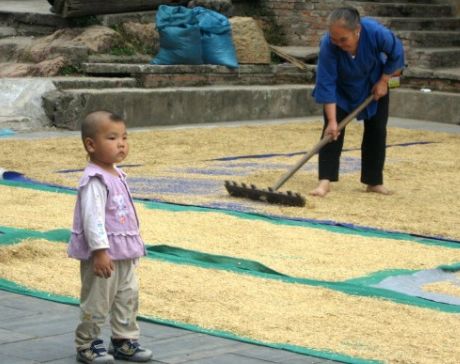In the second part of this travel memoir, Allison continues to trace the steps of her sojourn into the heart of China and share with us the beauty of a life painted by simplicity, innocence and tradition.
How better to begin a chapter of a day in a mountainous area than watching the inspiring scene of the sun slowly lightening up the sky? No doubt the horizontal sunrise on a beach is and will always be at the top of my list. But as early as 5.30 am, we climbed up to the not-too-high yet perfect viewpoint and waited patiently for a resplendent sunrise recommended by the villagers. We waited until 6.00 am when the sky would be bright enough. However, to our slight disappointment, we couldn’t see the fireball piercing through the sky with its presence. The sky was too foggy then and it subdued the power of the sun. With a tiny hint of regret, we packed our things and descended the winding mountain roads. Looking back, the beautiful mountain stood still as it always has and in all its glory, became sealed in our memory.
We headed to a small town called San Jiang by bus. While bus travel might not be appealing to everyone, it offers an economic and adventurous way of travelling from one place to another; it also covers large distances easily. However, it seems that bus travel even in these parts of China has slowly been forgotten, viewed only as a last resort when it comes to transportation. Sitting by the window, I quietly and fully enjoyed the splendid scenery outside. Being a passenger, I had no need to pay attention to the traffic on the road, only a town embraced by turquoise water and emerald green mountains. Apart from the treat of amazing scenery, travelling by bus to me felt like the best avenue to observe both the lives and culture of the local people in display. Indeed, it looked like the bus was the only mode of public transport as it was used by nearly all the residents here.
The people of this lively town must live a carefree lifestyle as even a man, naked but for a pair of flowery short pants, boarded our bus with ease, without a single uncomfortable stare from fellow passengers. As the bus continued to wind along the river and mountain sides, I noticed through the glass, that this small rural town was rather dusty. We later found out that construction work was being carried out at the centre of the town. It was sad to note that the hygiene and safety aspects of this little town were not satisfactory as we also saw small children playing nearby the hazardous construction sites.
From San Jiang, we then took a small van along a winding and hilly road to the Dong tribal village. You may have heard before that travelling to China requires caution as deceptive practices against foreigners are rampant. In our case, we had chosen a van which had offered a much lower fare than others without any suspicion. With much shock, we realised later that in order to navigate around the tribal village, we needed passes that should have come with the van in a package. Something we missed out on due to the lower fare we had negotiated with our van driver.
The Dong village is inhabited by a mysterious ethnic minority, the Dong tribe. After checking into a bamboo-made inn, we – despite being a looked upon as a group of ‘illegal immigrants’ – hired bicycles to gain precious insights into the ancient culture and natural beauty of the village and its people. We were delighted to find out that the village was actually off the tourist track; it explained why we were not disturbed by throngs of people like we had been at the LongJi Terraced Field. It was an entirely different and fresh environment.
The Dong tribal village is surrounded by hills with a small river passing through it. As it was drizzling, we could smell the aroma of fresh green grass in the air. While I’m not a fan of grass and flowers, I did like this smell.
At the centre of the village stands a theatre stage that provides a platform for young villagers to perform their traditional dances and songs. We also noticed that many of the villagers continue to wear their black and blue traditional costumes and speak in their Dong native language.
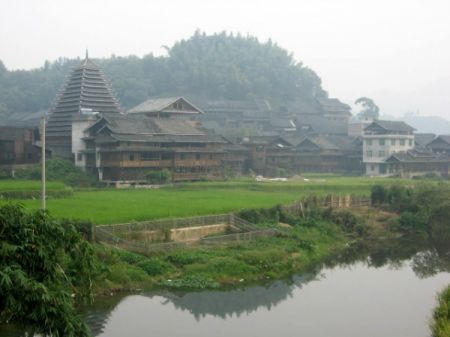
The chief attraction of the village is the famous Cheng Yang-Feng Yu (Wind and Rain) Bridge, a covered bridge which had been built over the river a long time ago to connect 2 villages. Exquisite carvings of legendary Chinese poems adorned the bridge although some of them were no longer visible due to erosion by the elements. It is indeed an architectural wonder as the planks had been fitted tightly without the presence of nails. Sometimes one can’t help but be amazed by the magnificent skills involved in the design of ancient architecture – like the Pyramids, for instance.
Apart from the bridge, drum towers are also among the special features of the village. These towers are venues for hosting important discussions or community activities like dancing and traditional folk song concerts in the evening. To the villagers, the drum towers are a significant congregation place just like our Parliament. It is said that these simple yet uniquely designed buildings are the most respected buildings in the village.
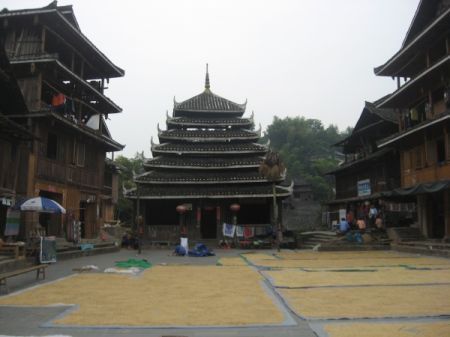
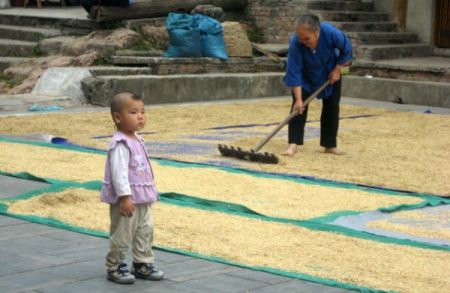
As we continued our exploration, we were very much fascinated by the magnificent wooden architecture here. The Dong people live in old wooden houses by the river. Every house consists of 3 floors: the ground floor is used for the purpose of keeping domestic animals and sometimes as a sundries store or workshop; the 2nd floor is used as a living area and kitchen; and the 3rd floor is mainly the bedroom. These houses were perhaps the most traditional and unique type of houses I had ever seen. The village itself was a scene of joyful colors – of the villagers preparing food, washing their hair and vegetables by the river, drying their newly harvested grains, weaving fabric and feeding their children.
Meanwhile, we saw children scattered everywhere, usually in the midst of play. It was the harvest season at the time and some young villagers were also seen holding their traditional dance festivals around the drum towers. Much as we would have liked to register these lively moments with our cameras, the villagers were rather shy and withdrawn. Under such circumstances, whipping out a camera would undoubtedly change the atmosphere instantly as suddenly, the villagers and we would cease to be people sharing a special moment together but become photographer and subject. It was not something you and I would like either. So while we easily snapped some memorable photos from a distance, we also tried to approach the people, asked if they would like to have their photos taken up close, and showed them the results after we had taken them. Unexpectedly, some children enjoyed posing for the small box in our hands.
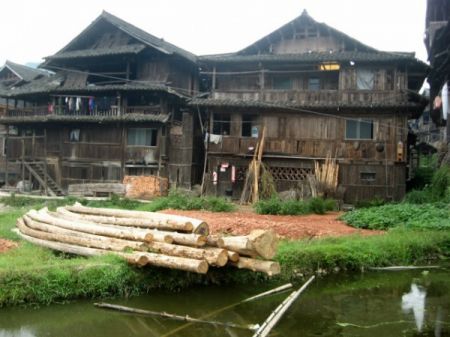
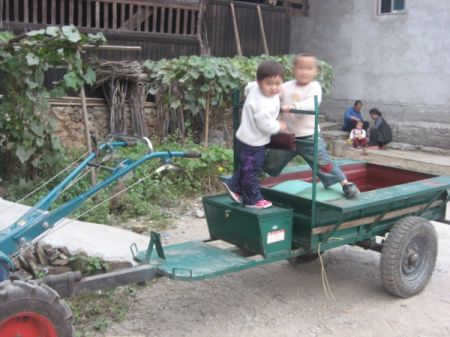
At night, we had the opportunity to taste some hearty family dishes and traditional deserts at a family bistro. It was humorous to see the bistro owner’s entire family caught up with the infamous match-making show ‘Fei Chen Wu Rao (If You Are The One)’ on TV, a programme that seems to have dominated the country’s prime-time belt. This is a reality show where young people openly seek their life partners amid jokes and piercing comments. We exchanged our views on relationships and marriage across different cultural perspectives. And in the conversation, discovered that, due to her skewed gender ratio, (read: more men than women due to the one-child policy), China’s women who were of marrying age were in high demand. Apparently, this situation was compounded by the fact that society here valued sons more than daughters; gender-specific abortions were common in China.
As a result, women here were considered invaluable and were therefore in a position to be fussy about their potential partners’ looks and status, especially income. Interesting, no? But as to how far this sort of speed-dating and match-made relationships – as opposed to natural binding of love – produced successful and lasting unions remained a question mark. Nevertheless, while enjoying the food, I found myself getting hooked to the fun-filled, light-hearted show. Even though it seemed a little ironic to have this sort of pragmatic love-seeking show being aired in a somewhat conservative village like this one.
Outside the bistro, it was all pitched black. A few homes were lit up with the help of gasoline but most were shrouded in total darkness. Accompanied by their dancing shadows on the ground, the children found their own entertainment among themselves, playing and giggling in the dark.
I once read in a book about the difference between ‘travel’ and ‘tourism’. With the latter, it is seeing the world from behind the glass – say, in a hotel, a restaurant or a bus – whereas in the former, you engage and interact with the people and experience their culture. The small interaction I had experienced with the family of the bistro owner made me glad that at least for that night, I was no longer simply a tourist but a traveller transformed by the village. At the end of our evening, we walked carefully around the village entrance with the aid of a torchlight to admire the brightly lit poetic Wind-Rain Bridge.
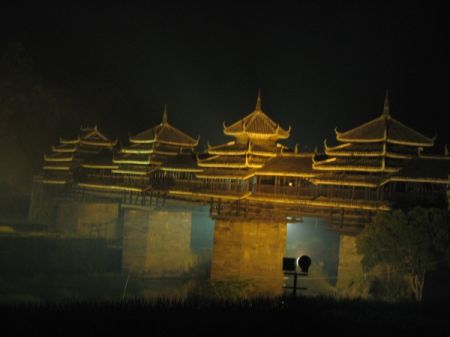
Later that night, as I sat by the dimly lit balcony and reminisced about the mystic and poetic scent of the village during the day, I stared into the endless diamond-studded sky and felt a slight wonder about the future. Who wouldn’t in these days of mine? Curled up on an old wooden chair which continuously made a cracking sound as I moved, I was simply overjoyed in my current no-rush solitude. It was so relaxing, as if I owned the entire balcony, was a part of it. I had secretly picked the farthest star to be my distant companion. And to avoid wasting the peaceful night, I began to peek into the pages of the book I had brought with me – a slim volume about the traveling tales of a little prince entitled ‘The Little Prince’.
Reading the book for the 3rd time, I wondered if anyone else was reading it at the same time I was, in some far-flung corner of the world. And if so, whether the such a synchronicity rendered us acquaintances. It was certainly a costly experience reading at the balcony as upon completing a chapter of the book, I realised that I had been badly bitten by mosquitoes. That night, I slept easily and peacefully on a small cotton pillow.
At the dawn of the next day, when the first rays of sunlight appeared in the sky, the whole village came to life. Most of the people of the Dong minority begin their day by filing into the field to work. Now, the sound of crickets was everywhere. And it wasn’t long before more unknown insects and birds joined in the chorus that livened up a cold and foggy morning. As we tucked into breakfast, we heard a conventional school bell tolling, signifying the beginning of school. This was quickly followed by the blast of the familiar Chinese childhood rhyme, ‘Xiang Jian De Xiao Lu’ (Countryside Small Roads), being broadcasted from an old school building not too far from us.
Echoing the rhyme were school children in their casual attire trudging to the school through the paddy fields. Some parents could be seen carrying the sleeping little ones on their shoulders. As I had nothing to do, I decided to follow in the tracks of a few parents who were accompanying their children and carrying their colorful school bags across the paddy fields. These scenes reminded me of my own childhood days spent in a fishing village. Schooling was fun then as it had much less formality and was conducted in a more relaxing environment.
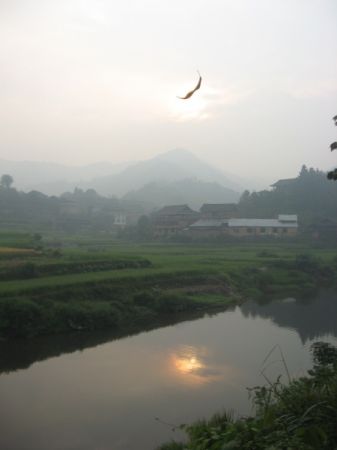
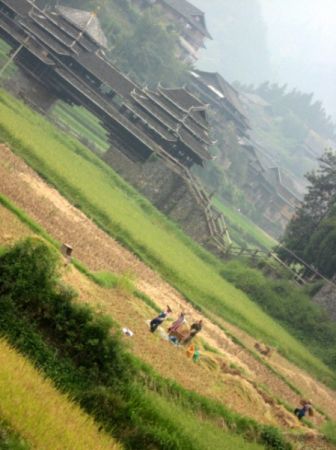
At about 9 am, the village became quiet again as most of the adults had gone down to the fields and the children, to school. At this time, the village was as beautiful and still as a portrait. While I am not a morning person, these tranquil village scenes have somehow taught me to appreciate mornings. Similarly, while I am not a keen nature-lover, the smell of morning dew and the fresh odors of the earth have magically transformed me into a new convert.
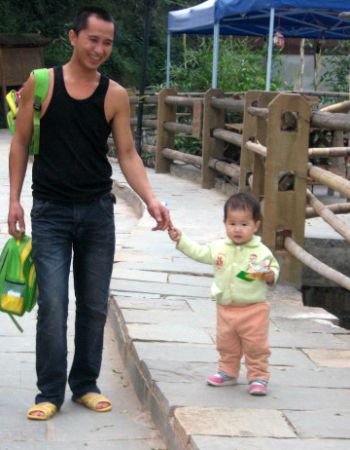
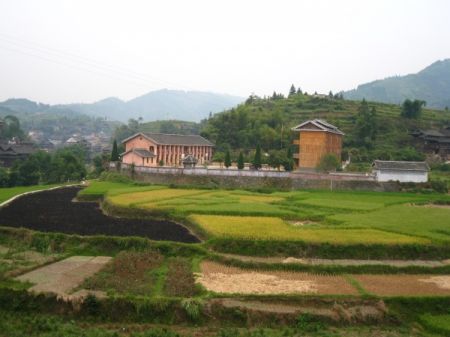
I like this place for its success in maintaining its village scent, its old school buildings, its untainted lifestyle and its people well. Usually small incidents help us remember and miss a place. Or more accurately, modest but meaningful interactions with the people of one place predispose us to remembering them deeply and fill us with a longing to return for seconds. For instance, Penang for me now is not so much about food anymore, but rather about the regular old taxi driver who used to pick me up from the airport.
Moreover, I like the feeling of (1) going to a place (2) experiencing it and (3) upon returning home and reading about it in the newspaper one day, finding that it is not the same as I now have a personal relationship with the place and its people. What this village lacks in comparison to the LongJi Terrace Field, it more than makes up for it with its peaceful, vivid and less commercialised life. Although the time I had spent here was rather short, I felt as if Time stopped the moment we walked into its embrace. In fact, I felt our pace had also fallen in step with the beat of the villagers’ footsteps
We left the village late that morning for our next destination. The next experience always exceeds the one before, especially when you are in China. And now, another up-close-and-personal experience with water and mountains awaits us on our 4th day.

